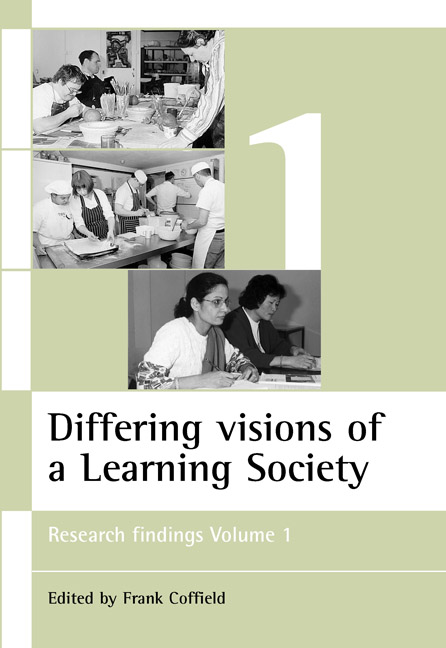Book contents
- Frontmatter
- Contents
- Notes on contributors
- Introduction: A critical analysis of the concept of a learning society
- one ‘Worlds apart’ – Education markets in the post-16 sector of one urban locale 1995-98
- two Unifying academic and vocational learning in England, Wales and Scotland
- three Skill development in higher education and employment
- four The variable contribution of guidance services in different types of learning societies
- five Changing patterns of training provision in the National Health Service: an overview
- six Working and learning in Britain and Germany: findings of a regional study
- seven Development of knowledge and skills at work
- Index
five - Changing patterns of training provision in the National Health Service: an overview
Published online by Cambridge University Press: 05 July 2022
- Frontmatter
- Contents
- Notes on contributors
- Introduction: A critical analysis of the concept of a learning society
- one ‘Worlds apart’ – Education markets in the post-16 sector of one urban locale 1995-98
- two Unifying academic and vocational learning in England, Wales and Scotland
- three Skill development in higher education and employment
- four The variable contribution of guidance services in different types of learning societies
- five Changing patterns of training provision in the National Health Service: an overview
- six Working and learning in Britain and Germany: findings of a regional study
- seven Development of knowledge and skills at work
- Index
Summary
Background
The focus of our Learning Society project was on the continuing education of nurses and allied staff working in the National Health Service (NHS). The project addressed issues relating to access and equity: factors which may encourage or inhibit progress towards a Learning Society. In this chapter we also examine the effects on participants of taking responsibility for their own learning by undertaking courses in their own time or at their own expense. This latter issue has been the focus of attention of policy makers and employers. Over the past two decades, motivated by a need to reduce the perceived burden of training on employers and the state, successive governments have encouraged a shift towards regarding postcompulsory education and training as an individual responsibility (King, 1993). It could be argued that in policy terms such a shift has the potential to be counterproductive in that it might systematically disadvantage certain sectors of the workforce previously targeted as training priorities: women and the less well qualified.
The shift of responsibility for continuing education and its consequences can be studied to good effect in the NHS. It is one of the country's largest employers, with almost a million employees and requires a varied, flexible and well-trained workforce. It is one of the major employers of women, 47% of the NHS workforce being nursing and midwifery staff who are predominantly female (NAHAT, 1995). Hence, studying continuing education in the health service allowed us to examine participation by a range of staff and to reflect on the implications of combining working and learning for individuals with differing employment and domestic circumstances. The study was carried out in the context of major changes both in the funding arrangements and organisation of health services, and in the provision of education and training for health service staff.
The changing policy context
Over the past 15 years private sector ways of working have been introduced explicitly into the supply of health services, and into the organisation and purchasing of continuing education and training (Humphreys, 1996). The reorganisation of the NHS and the attempt to encourage the development of a market in healthcare has been reflected in the reorganisation of training budgets.
- Type
- Chapter
- Information
- Differing visions of a Learning Society Vol 1Research Findings, pp. 167 - 198Publisher: Bristol University PressPrint publication year: 2000



